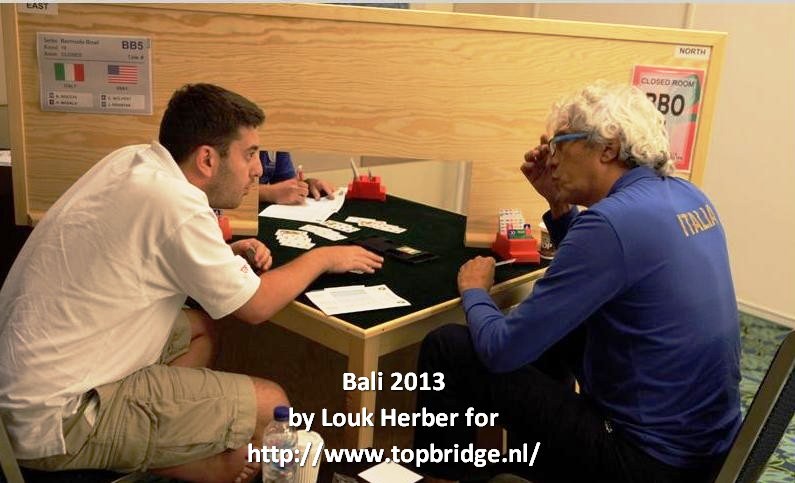Source: Bridgewinners; 4 Way Transfers with Range Ask
Four-way transfers have been pretty standard among experts for quite a long time. In recent years, experts have found a small tweak which makes it a much more effective system. Rarely, expert tweaks not only make the convention better, but also in fact make them easier.
The major flaw of 4-way transfers as they were taught to me (2![]() for
for ![]() , 2NT for
, 2NT for ![]() ) was that the trade-off of using 1NT-2NT to show diamonds meant that in order to invite with 8-9 points you now needed to go through Stayman. This caused declarer to unnecessarily reveal information about the majors which in a touch-and-go 2NT or 3NT is not ideal.
) was that the trade-off of using 1NT-2NT to show diamonds meant that in order to invite with 8-9 points you now needed to go through Stayman. This caused declarer to unnecessarily reveal information about the majors which in a touch-and-go 2NT or 3NT is not ideal.
The new method removes this by adding a hand type to the 2![]() club transfer:
club transfer:
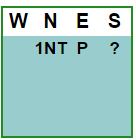
- 2
 = 5+
= 5+ ,
, - 2
 = 5+
= 5+
- 2
 = 6+
= 6+ OR 8-9 balanced w/o a 4-card major
OR 8-9 balanced w/o a 4-card major - 2NT = 6+

I have put in bold the new addition to the method. Let’s discuss the followups to the 2![]() bid:
bid:
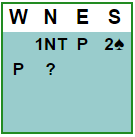
- 2NT = I have a minimum for my range (I would not accept your 8-9 balanced invite)
- 3
 = I have a maximum for my range (I would accept your 8-9 balanced invite)
= I have a maximum for my range (I would accept your 8-9 balanced invite)
By asking opener to show a minimum or maximum immediately, responder can continue with a transfer auction as before, while at the same time catering to the 8-9 point range. The trade off is that opener can not make a vote on the club suit (expert standard was 2NT I don’t like clubs, 3![]() I do like clubs).
I do like clubs).
When responder has 8-9 balanced, the rebid will be quite obvious:
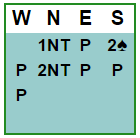
(The old-fashioned auction 1NT-2NT-Pass)
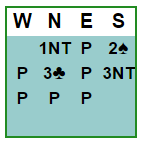
(The old-fashioned auction 1NT-2NT-3NT)
When responder actually has clubs, nothing has changed. All bids continue to mean exactly what they would have meant in the old 4-way transfer structure. Here is a guide for what I play with my partners after opener responds to 2![]() showing his range:
showing his range:
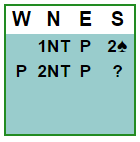
- 3
 = 6+
= 6+ , signoff
, signoff - 3
 = 6+
= 6+ , short
, short  , Game Forcing OR 6+
, Game Forcing OR 6+ , no shortness, with slam interest
, no shortness, with slam interest - 3
 = 6+
= 6+ , short
, short  , Game Forcing
, Game Forcing - 3
 = 6+
= 6+ , short
, short  , Game Forcing
, Game Forcing
All of these responses (except 3![]() , obviously) apply over a 3
, obviously) apply over a 3![]() rebid by opener as well.
rebid by opener as well.
The 3![]() /3
/3![]() bids showing shortness are standard treatments as we would use Stayman whenever we have a 4-card major and a longer minor. The 3
bids showing shortness are standard treatments as we would use Stayman whenever we have a 4-card major and a longer minor. The 3![]() call is less standard but useful. Opener can bid 3
call is less standard but useful. Opener can bid 3![]() to ask which hand type it is, and responder can show the unbalanced type with 3
to ask which hand type it is, and responder can show the unbalanced type with 3![]() and the balanced type with 3NT.
and the balanced type with 3NT.
